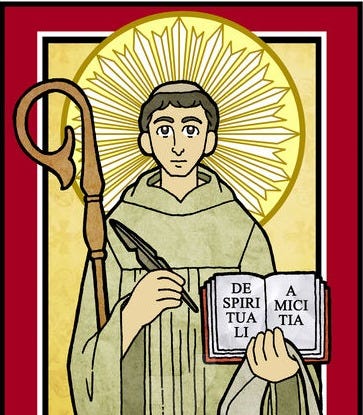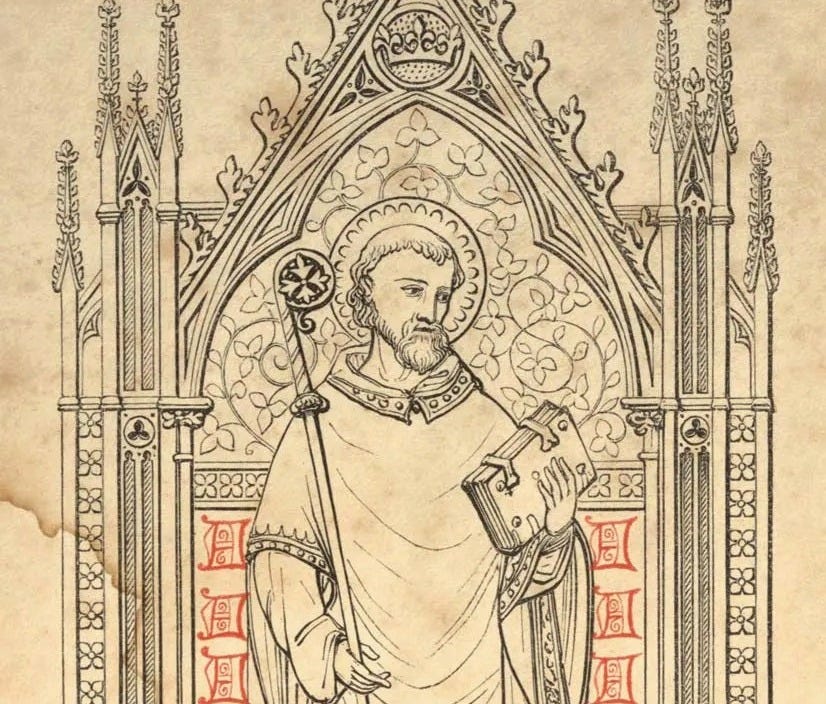Advent Day 1: Aelred of Rievaulx
God is friendship
God is friendship.
Advent Day 1: Aelred of Rievaulx (1110-1167)
The young man riding horseback through the misty moors of Yorkshire, England one day in 1134 should have been happy. By any measure of the era, he had it all. As a boy, he had received the best education available, at the cathedral school in Durham. At fourteen, his reputation for being a good friend to all brought him to the attention of King David I of Scotland who adopted him into court life as a companion for his son. By his twenties he’d risen through the ranks to become steward of the royal household.
It was a life of luxury and opportunity few could imagine. Yet, like many fortunate people, then and now, he felt a nagging emptiness that all the material comfort in the world could not cure and, in some ways, seemed to make even worse.
His name was Aelred, and he was now returning home from a royal mission to York when he came around a bend in the road and caught sight of a new monastery called Rievaulx (pronounced ree-VOH). It wasn’t much to look at in those days—just some ramshackle huts on the muddy banks of the River Rye. But Aelred decided to stop in for a rest before continuing on to Helmsley Castle, his destination for the night.
At Rievaulx, Aelred met the abbot, William. Two years earlier, he and the eleven other monks had come up from France as part of a protest movement that rejected the trappings of wealth, power and royal patronage which had corrupted so many other monastic communities. Here, on the banks of the Rye, they lived on a simple daily diet of prayer, meditation and work.
Lying in bed that night at Helmsley Castle, Aelred couldn’t stop thinking about Rievaulx. Life there, the monks all working together in devotion to God and one another, it seemed so peaceful and pure—so unlike the backstabbing dramas that were a continuous feature of King David’s court. Though Aelred rarely had a moment alone at court, he felt lonely. He longed for friends more than anything. But there was no true friendship to be had where trust was in short supply. Years later, he wrote of this time, The (desire for) friendship drew me more strongly than ever. Now, at Rievaulx, Aelred had glimpsed an alternate life.
As the night wore on and the fire in his hearth burned to embers, Aelred decided he must act. It was now or never. When the pale sun rose over the moors, he dressed, went downstairs, and informed his very surprised host that he was abandoning his royal life of luxury to become a monk.
When Aelred presented himself at Rievaulx later that day, however, he met an obstacle: the abbot. In William’s experience, privileged men made poor monks. On these grounds, he respectfully declined to accept Aelred into the community.
But Aelred was determined. In the face of rejection, he summoned all those powers of persuasion which had made him such a valued diplomat and courtier and used them to try and convince William he was ready for such a bold move. After four days, the abbot relented. That same day, Aelred threw off his royal robes and donned the brown habit he would wear for the rest of his life.
Aelred brought many gifts to Rievaulx, among them a knack for administration, organization, and diplomacy. But it was his gift for friendship, which King David had spotted in him as a boy, that set Aelred apart. In the years ahead, this talent attracted thousands to Rievaulx, transforming the abbey from a tiny scattering of huts to a center of European spirituality.
Though monasteries rise and fall on their inhabitants’ ability to live together in harmony, in the Middle Ages friendship was not usually part of the monastic equation. In fact, as Aelred soon learned, it was actively discouraged. The overriding belief was that a monk’s only true relationship should be with God.
Aelred strenuously disagreed. Friendship was his vocation and calling, the one thing he was good at that was worth more than all the others.

In an echo of disciple John who pronounced God is love, Aelred declared, God is friendship. Friendship wasn’t just a happy by-product of living in beloved community, it was a means of manifesting God’s kingdom on Earth as it is in heaven.
Centuries before modern psychology, Aelred understood the importance of vulnerability and trust in forming lasting relationship. In his view, the friend becomes another self, with only one goal: to encourage and support the health and wholeness of one another.
…your friend is the companion of your soul…to whom you entrust yourself, from whom you hide nothing, from whom you fear nothing…For a friend is the sharer of your soul. To your friend’s spirit you join and attach your own so your two spirits become one. [So] here we are, you and I and…Christ in our midst. No one can interrupt us. Now let us speak to each other in sacred ways.
Friendship is holy ground, a space where two people may bring their whole selves, wounds and all. When this happens, Aelred says, Christ is born in their midst.
Word about the unusually kind and gentle monk soon spread around England. Within the first five years of Aelred’s arrival at Rievaux, hundreds of young men were drawn there in hopes of getting time with him. Some stayed and became monks. Others became lay brothers. But most, fleeing troubled lives, and in need of someone they could talk to who would show them kindness, lingered only a short while. Nearly all of them left feeling they had been healed in some way. Without benefits of modern medicine or psychology, Aelred had simply loved them back to life.
By the time Aelred was thirty, he had become a leader of the Rievaulx community which, thanks to his reputation, was fast expanding. Due to his decades of experience in David’s court, he was chosen by Abbot William to represent Rievaulx in the world. In this role, he maintained correspondence with a wide variety of people, including kings, queens and popes. He also carried out a diplomatic mission to Rome, and met his order’s founding father, Bernard of Clairvaux, in France.

But Aelred’s heart would remain always with Rievaulx. There, after William’s death in 1147, Aelred was chosen to succeed him. He would remain at Rievaulx for the rest of his life.
As abbot, Aelred shunned the dictatorial style favored by many monastic leaders. Instead, he guided his flock like a gentle shepherd. In this spirit, Rievaulx continued to grow. What had been a dozen monks in huts when Aelred first arrived, by the 1150s had blossomed into a community of 800 living in one of England’s most picturesque monasteries.
Despite the growth, Aelred always made time to meet with his fellow monks one-on-one, recognizing that each individual had their own personal struggles and stories. With this commitment, Rievaulx remained a place of deep spiritual contentment.
Feeling this contentment in his soul, he once wrote:
The day before yesterday, as I was walking the round of the cloister, the brethren were sitting around forming as it were a most loving crown…I found no one whom I did not love, and no one by whom, I felt sure, I was not loved. I felt such joy that it surpassed all the delights of the world.
We should all be blessed with such community.
As Aelred entered his fifties, he began to suffer great pain due to what modern scholars believe was arthritis. Even this, he saw as a chance to deepen friendship, as friends could carry one another’s pain with patience and care.
Charity is a life-giving relationship…the beginning of our union with God.
Knowing he didn’t have many years left, Aelred threw himself into writing. The great fruit of this period is his masterpiece On Spiritual Friendship, a field guide for incarnating God in the world through relationship. For Aelred, wherever there was friendship, there was God. In a human life, there was no higher calling than creating that sacred space where love could flourish.
Near the end, he wrote,
Nothing [is] sweeter to me, nothing more pleasant, nothing more valuable than to be loved and to love.
Aelred of Rievaulx died on January 12, 1167, at the age of fifty-six.

Practice
Aelred of Rievaulx transformed countless lives with his spiritual friendship. My guess is that you, too, have been blessed by spiritual friends.
By spiritual, I mean a quality of faithful presence and care that exists between two people and which transcends common interest (e.g. you both like running or hiking) or situation (e.g. you work together). A spiritual friend is someone who accompanies you, but from whom you need nothing and to whom you have nothing to prove. This kind of relationship, according to David Brooks in his wonderful guide How To Know A Person, is marked not by willfulness but by willingness…to let the relationship deepen or not deepen, without forcing it either way. In spiritual friendship, You are acting in a way that lets other people be perfectly themselves.
Often, a spiritual friend is someone you really do call friend by the common definition. But a spiritual friend can also be someone who guided you along your path, opened your soul in some way, helped lead you to a deeper place, or saw some talent or potential in you before you could see it in yourself—a teacher, pastor, youth leader, coach, etc.
For your practice today, pick one or more spiritual friends to connect with in person, or through a phone call or letter (but not text which studies have shown have far less impact than these other modes of communication). Let them know how much their friendship has meant to you, and why.
Holidays at Life In The City
All in-person gatherings listed below happen at 205 East Monroe St. in Austin, Texas.
Dec. 8, 11:15 am: LITC’s original musical, Make Room In Your Heart. Dec. 21, 6:00 pm: Blue Christmas, an intimate service for the longest night of the year. Dec. 23, 6:00 pm: Christmas Eve-Eve, an LITC tradition! Dec. 29, 11:15 am: Welcome 2025 with a fun, casual service.
Contemplation In The City
Life In The City’s contemplative community meets regularly to practice sacred traditions like Lectio Divina and Centering Prayer. If you’re in Austin, consider joining one of our gatherings. You might also find meaning in our monthly newsletter in which we wrestle with how to live a spiritually engaged life in the modern world. Read more here.
Ready For More?
Read the Introduction to the 2022 edition, to find out how my experience of September 11, 2001 became my gateway to Advent.
Read the Introduction to this year’s edition of The Heart Moves Toward Light: Advent With The Mystics, Saints and Prophets.
Find more mystics, saints and prophets in our Archive.
Feedback
Catch a typo? Have suggestions for mystics, saints and prophets for a future year? Leave feedback in the Comments below or email Greg Durham at greg@litcaustin.org.





Dear Readers, In the Practice section, I encouraged you to reach out to a spiritual friend via an in-person meeting, through a phone call or by letter, but not text. In that note I said that text has a "...greater impact" than those other methods. I meant to say the opposite. In fact, studies show that, while text has its value, these other modes make a far greater impression on their recipients. Greg
Thankful to be entering advent with you again. Made last year feel whole in a way that nothing else in my life could.